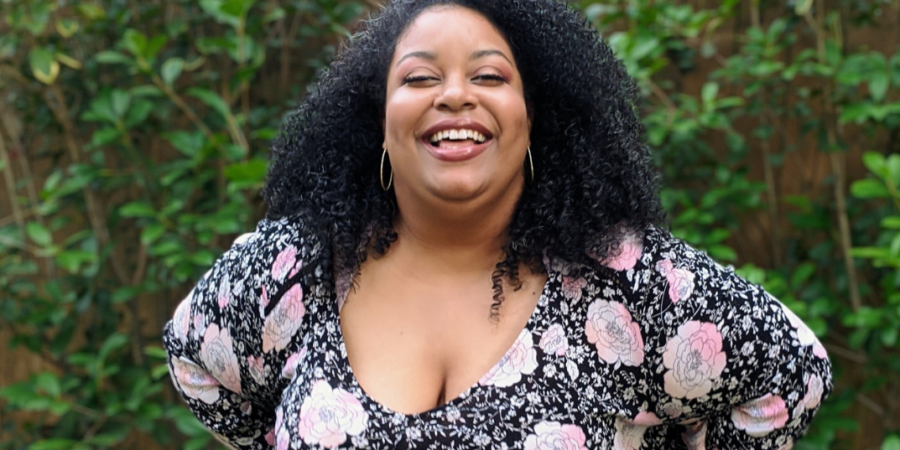Editor’s note: I put this blog on hiatus in the spring when the pandemic first hit, and I apologize that I’m just now returning. I planned for a short break, but I felt paralyzed and drained by this year’s stress and uncertainty. But I’m finally ready to return, and I’m thrilled to restart with this timely, powerful interview with one of my personal sheroes, who reminds us of the importance of intersectionality in this work. –Emily
Jordan Maney loves love. Wanting to launch a career in the wedding industry, she started working at a venue in her hometown of San Antonio, Texas. Maney wanted to celebrate love with no bounds, so she was horrified to witness the homophobic owners turn away same-sex couples.
She eventually left to create All the Days, her own wedding-planning business supporting all couples, especially those with a social justice mindset (she gained notoriety for condemning plantation weddings). But Maney received an influx of LGBTQIA clients seeking an open-minded planner.
Maney herself is straight, but seeing how underserved queer couples were, her focus became supporting LGBTQIA clients and building a network of affirming vendors. In her spare time, Many also helped build and run local organizations that supported female or nonbinary entrepreneurs, especially those of color.
Then, after years of tirelessly planning and executing weddings, the pandemic struck and Maney watched her business evaporate. As months passed and nearly all her weddings were cancelled or postponed, she knew she needed to pivot her work somehow. When George Floyd was murdered in June, the answer became clear to her.
Maney always had a passion for educating and centering inclusion and diversity. She was exhausted by the pervasive racism in America, so she used this opportunity to sunset her wedding business and pour her energy into advocacy.
She created the Step Up Pledge, demanding the wedding industry and media to better represent and show up for Black couples and industry professionals. Ever the entrepreneur, Maney also started offering business coaching focusing on queer women and nonbinary people of color. She also started speaking and participating in workshops on inclusivity and anti-racism. Now she’s creating her own; on November 16 and 17, she’s hosting the Ally to Advocate Summit, an online anti-racism and inclusion program for progressive business owners.
Read on for our interview with Maney to learn why she was so passionate about being an LGBTQ wedding planner, how the summer of 2020 transformed her work, how intersectionality makes anti-racism work relevant everywhere, and how we can all be better advocates — not just allies.
Profiles in Pride: I know you observed discrimination working at a traditional wedding venue, which led you to go out on your own and focus on inclusivity. What happened?
Jordan Maney: I’m not going to name the venue, but it was a highly toxic work environment. This was before the SCOTUS marriage equality ruling. When it came to conversation around queer couples, it was, “Oh, well, you know…”
It wasn’t until a couple came in and the manager at the time was like, “Oh gosh, I hate when this happens.” I didn’t understand. She said, “You know how the owner is, he doesn’t really vibe with that.” I didn’t know what he was talking about.
The idea of turning someone away was so unfathomable to me. I learned they had a process — clearly undocumented, otherwise that’s a lawsuit — where if a queer couple came in, they’d take their information down so if they called again they’d be marked. They’d take them out of the office toward the back and tell them their policy.
I remember standing there, watching through the window as the manager took this couple back. Just seeing their faces. Then they have to walk back through the office and leave while everyone is looking at them. I was like, why are we doing this? That is cruel beyond measure to get someone’s hopes up to come here, to be judged, to be shamed, and then to be dismissed.
I was always told, “Oh, it’s the owner!” But a lot of that bias and prejudice was also coming from people who worked there, even though the wedding industry is mostly women and gay men, and gay men even worked there!
I saw that, and later I saw a wedding there that really went against my ethics. So two consenting, loving adults who happen to be queer is not OK, but this shit is? What are we doing? It just didn’t make any sense to me.
I remember thinking to myself, I know I can do better than this. And if this is what they’re experiencing here in the city of San Antonio, and there are so many venues out in the country, I know it has to be worse elsewhere.
I wondered, is there a way to skip this step, so they don’t have to put themselves out there and be vulnerable and be rejected by people they want to pay money to? Is there a way to help couples not have to experience that step?
At that venue, I learned a lot about events, about working with people, about the emotional stress and chaos of a wedding day, and wedding planning. But I also learned that just because you’ve seen something done a certain way doesn’t mean it can’t be done in another way.
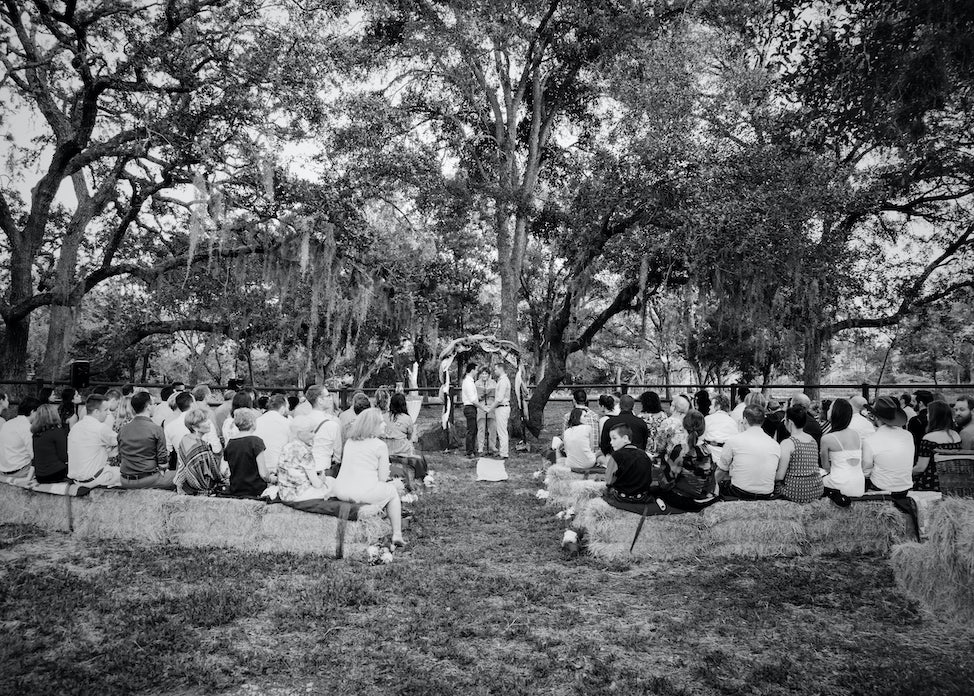
PIP: Absolutely. When you left and started your own business, did you plan on being an LGBTQ wedding planner from the beginning?
JM: Not initially. When I came up with the idea for my business All the Days, it was 2015, and I wasn’t sure if anyone would want to do it. It wasn’t until 2016 that I debuted it, and I started to realize a pattern in couples I’d have consultations with.
For every straight couple, I’d get two queer couples. I noticed the relief they had at the end of the consultation. They’d come in tense and uncertain, and when I’d say things like “who’s your partner?” or I wouldn’t flinch when they mentioned they were getting married to a woman and not a man, it became this understanding of, ‘oh, you’re not just here to get our money, but also, you care.’ They weren’t anticipating or expecting that from someone based in San Antonio.
The turn for me was, if most of the couples that I serve are a part of the LGBTQIA community anyway, why not just be open about that and center that experience versus worrying about trying to be like every other wedding planning business in the city?
So I started saying that — “Hey, we’re not LGBTQIA-friendly, we’re LGBTQIA-loving. Come to us if you have questions, even if you can’t afford us. I just want to make sure you’re headed in the right direction when it comes to planning.”
It’s such a beautiful process, helping couples through the process of sometimes even coming out to the family, helping the couple navigate through those dynamics with their families, with vendors, and making sure they were surrounded with as much as love as they needed and support from their vendor team on a really critical day.
That’s where it started, having couples come to me and realize ‘you’re not here to proselytize, you’re not going to condemn, you’re not going to fake the funk and say I love you guys but obviously be uncomfortable.’
PIP: How was your business impacted by the pandemic and racial justice reckoning in America this summer, and what led you to pivot to focus on education?
JM: I feel that in regards to racial justice, inclusion, equity, diversity, there had always been a value proposition of that in All the Days. That was always the core foundation — that the couples who come to us will be treated with love and joy, because I know we have to counter a lot of the prejudice and bullshit that happens outside of their interactions with me.
The shift away from doing wedding planning obviously really started with the pandemic. It went from being two weeks away to having my first wedding of the season, to that wedding getting cancelled, to all of my spring getting postponed within about nine days. Then talking to my fall clients, saying not to rush to make a decision yet, but there was a lot of uncertainty and not knowing what’s going to happen next.
That was in March, then I waited around in April to help the clients that I could. May rolled around, when I was supposed to have four weddings, and I was trying to manage client and customer expectations.
Then June rolled around. Breonna Taylor’s murder had already happened. Ahmaud Arbery’s death had already happened. There was already this ‘here we go again’ process of grieving. But there was something about George Floyd in June that just hit me differently.
I don’t know if it was the straw that broke the camel’s back, but I just got into this space of feeling that this was enough. I couldn’t handle too much more, and to have to grieve in such an isolated way because of the pandemic was difficult.
So I made a video petition called the Step Up Pledge for major wedding media outlets to step up and not just post a black square on Instagram and give these empty platitudes about how they support Black Lives Matter. Show me. Show us. Do you support Black event professionals? Do you support Black love? Especially Black queer love? Because we really don’t get enough of that in media!
I began speaking more on that and collaborating more with people in that space and facilitating discussions, and then it became facilitating workshops and other things. I realized that education space was something I’d already been doing, but it just ratcheted up exponentially, and I really enjoyed it.
I make sure of course that everything is grounded and based in critical race theory; I’m not just pulling it out of my ass. But I know that I’m really good at digesting concepts and being able to teach that to people in a way that makes sense to them. I also know that I’m also really good at putting people at ease so they can hear difficult things more often and are willing to share.
I know not every Black person has that emotional bandwidth, and they don’t need to. So I was like, “Hey, this is where we are with things, so let’s see if I can impact people in a positive way to change and wake up and unpack their bias in a way that they have better awareness of it.”
That was the transition. It was always in my work; it was always something that I was advocating for. It was always something clients came to me for because I had a no plantation wedding policy, and I worked really hard to highlight better representation across racial lines, gender identity, and everything.
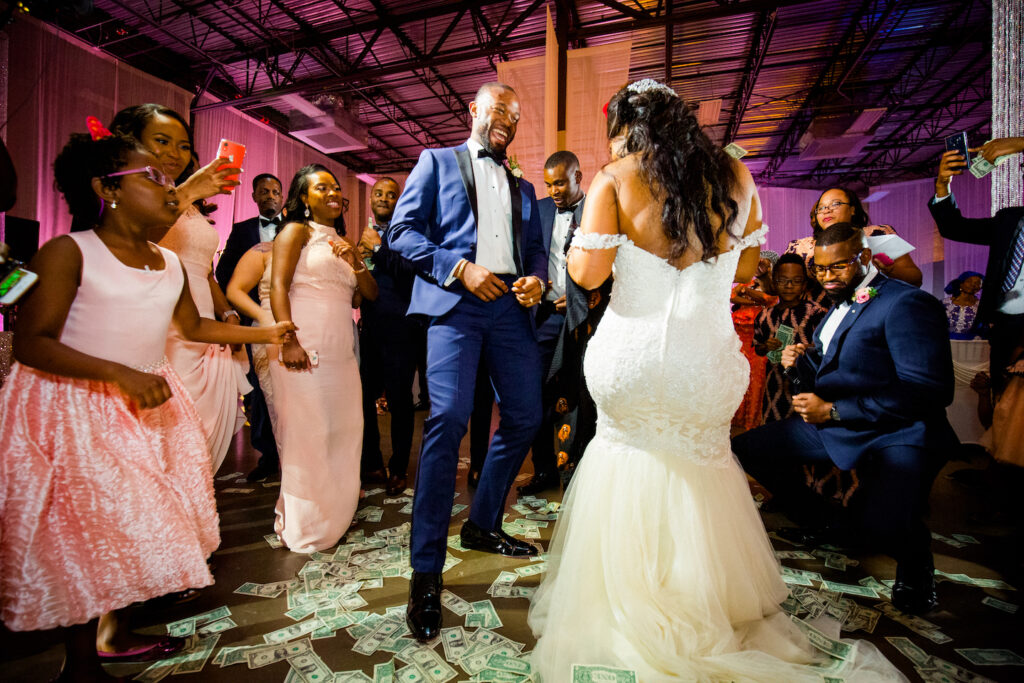
It was always the crux of the work, but it got highlighted more because of so many murders of Black people, especially Black trans people. I just really wanted there to be an opportunity to facilitate more conversations and development around that.
I still have my final four weddings left, and I will help those who postponed up until the end of 2022. It was a beautiful wedding planning business, but I have a sense of relief, because I think I’d been using it for the past 18 months to two years as an excuse to not go after what I really wanted to do. I actually created something this time last year that I didn’t sell, because I didn’t want to sell it, because then I would have to do it. Then the pandemic hit, and something just clicked in my brain. I realized now I can focus on what I actually want to do.
I’m also trying to build business coaching for queer, particularly women and non-binary people of color, so we can unlearn a lot of harmful white supremicist techniques when it comes to selling, when it comes to money, when it comes to personal development. Like that whole wake up at 5 a.m. and take a cold shower thing — please! So there’s that aspect of that too.
PIP: Please tell us about your upcoming Ally to Advocate Summit! Why did you create it, and what do you hope it will accomplish?
JM: The summit came about as I started having these really tough conversations with large wedding media outlets. I got a lot from the conversations, but I wanted the people who signed the Step Up petition and who had been doing some advocacy work to come out and see what accountability and action looks like. And to get better clarity around social justice concepts like anti-racism, and removing the narrative of being LGBTQIA-friendly and moving towards loving. And of course, intersectionality.
But more importantly, I wanted progressive business owners to get activated and apply those practically to their businesses. It’s great to have anti-racism in a personal advocacy component, but what does it look like when you add it to your business? How does it show up in your branding and marketing and your relationships and community building?
We are having Juany Torres, who is amazing, talking about how we get connected to activists and policymakers. We’re having Michael and Lawrence Broughton from Black Gay Weddings talk about building community. We’re having Megan Hale talk about how to take white supremacy and patriarchy out of how we create money and wealth and being financially sustainable so we can be relevant when it comes to these topics.
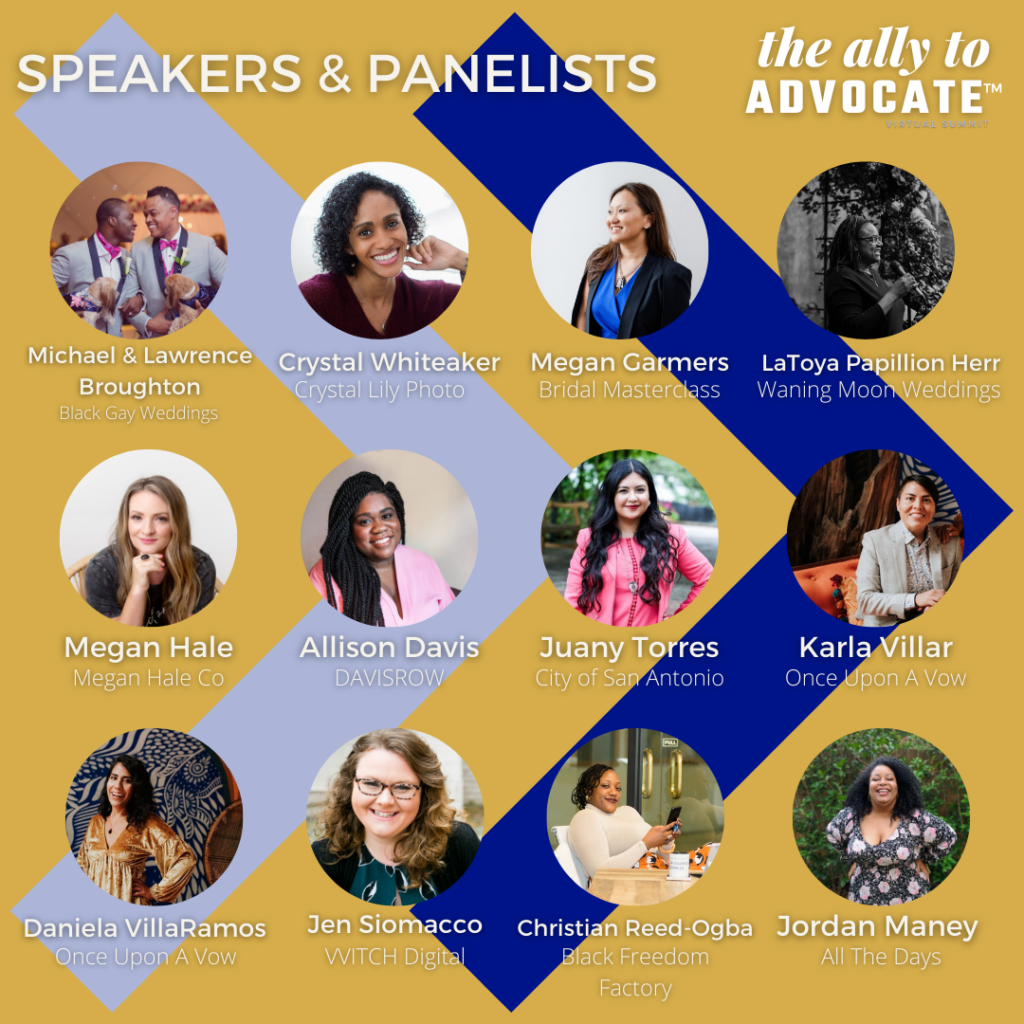
We’re really creating a progressive bootcamp for business owners who say they want to do the work and dedicate themselves to that work and what it looks like. There will be a wedding media accountability panel, a panel on community building, and some community building networking happening. It’s concepts on Monday, then on Tuesday, it’s all about the practicality of building that into your processes and your branding and your marketing. I’m really excited about it!
PIP: I often hear the word ally, activist, advocate used interchangeably. What do they mean to you?
JM: There’s literally a whole session in the summit on those three terms, because I think it’s so important for people to think about it. A lot of people want to contribute to a movement but will delude themselves into thinking they have to show up in a way that’s not authentic to who they are and also not very helpful.
To me, an activist is someone who is on the ground, who has dedicated most of their livelihood toward changes and policy legislation and causes either local to them or that are important to them.
An ally is someone who, from my experience, is very passive in their support. There’s no real risk involved in how they support. It can be like, “Well I posted that black box on Instagram, I’m an ally!” It’s usually something self-imposed, such as, “I’m an ally, I consider myself an ally.” But does that community you’re supposedly supporting consider you an ally? It’s usually more of a passive, ego-driven thing.
Whereas to me, the word advocate is, “I may not be part of your community, but I got you. I might not show up in the way that an activist does, but I’m still going to support the community in ways that are most effective.”
To me it’s more about being effective and mission-driven versus ego-driven. It’s more so a position you play when you know you’re not the front of the line. Activists are the ones who are usually putting their bodies on the line.
Advocates to me are like the Black salon owners from the ‘60s who used money from their businesses to send Freedom Riders and a lot of the students to go to sit-ins. It’s, “I’m going to support you, either financially, by getting media to you, by getting policymakers together, or going to support causes in the ways that are most effective” versus just putting on a safety pin or posting online.
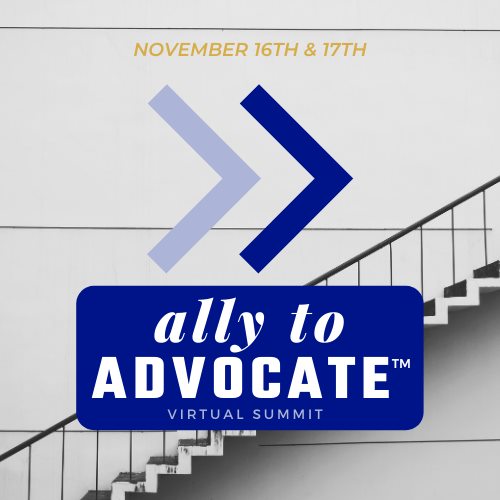
PIP: I’d love to hear more of your thoughts on intersectionality. Because on the surface, someone could say this is an LGBTQIA blog, and your work is on anti-racism, and those are two different things. But there’s an increasing awareness of how everything is connected, and how anti-racism work is applicable to everyone and everything.
JM: Yes! There’s this weird thing with ‘identity politics,’ a buzzword I hate so much. People would say, “Identity politics are the reason that XYZ.” But all of these things are connected.
We can’t have a conversation about racism without having a conversation about sexism, homophobia, all the other identities and how they intersect and how they impact a single person and whole communities.
I know for some people that because of their experience and also because of their bias, they focus on one. But for me, I’ve always wanted to have a holistic approach to how we talk about what is essentially hate. Hate in action, hate in law, hate in society. And how we curb that and change that.
I’d love to be optimistic enough to think that we can completely squash it, and all forms of hate one day will just not exist. But I know better than that. When I think of intersectionality, it’s like that movie ‘Pleasantville’ Or ‘Wizard of Oz.’ She had seen her life in black and white, and then she opens the door and it’s in full vibrant color.
Anytime someone comes to you and says, “Hey, let me show you what transphobia looks like and how that comes up in my life,” it’s like being introduced to the color blue. Then someone says, “Let me show you how racism impacts my life.” You get introduced to the color red.
You eventually start to see, and the more you understand these different but not so different experiences, the more you get to see the world in full color and understand how all of these things are working in tandem together intentionally. It’s not like you can excise racism and just say, “OK, well we got that one done,” when it impacts so many other experiences.
For me, it’s always been an intersectional lens. It’s something I have to continually check myself on and sometimes have to get checked on, because I don’t naturally like the idea of excluding people. But I know my biases and lenses, like the disabled community and how sometimes I might miss the mark on that.
All of it just comes down to, no one person is a singular thing. If we all have multitudes inside us, we need to be having conversations about how those things all work for and against us.
The most annoying thing as a person who loves organization and planning and strategy is that the thing about systems of oppression is how effortlessly they work and function, because a lot of it is self-regulating.
To me, if we’re going to have these conversations about justice and equity, it has to come from an intersectional lens. It can’t just be, oh well, we talk about the queer community, but there are people who are Black and queer and disabled, there are people who have a bunch of things working against them in a society like ours. It’s important to be able to distinguish the individual struggle but recognize it’s a collective fight.
PIP: Right now, a lot of white people want to step up and become better advocates, but many have been conditioned to not talk about race/racism. And I know some of us worry about offending people, doing more harm than good, or appearing performative. What’s your advice to someone who wants to be a true advocate?
JM: You have to be willing to get it wrong to get it right. Accountability is uncomfortable for everybody. It’s not a fun thing that we just do and everybody just feels good and we play Candyland at the end.
The goal and the mission is always the growth. If we’re focused on that, the uncomfortable parts of it don’t carry the same weight as other things do. So if you’re worried about, ‘I want to make sure I say the next right perfect best thing that will make everyone happy with me,’ that’s just not going to happen. That’s not realistic.
If you get checked, you get checked. It’s not the end of the world. One of the intensives that I do is on understanding personal advocacy, and part of unlearning your personal biases is understanding what’s noise and what’s constructive criticism.
If you have a relationship with a person or they have shown in some way that you’re investested in you doing the right things, usually that will be where the constructive criticism comes from. And there will be noise; there are people who don’t know your intentions, who had a bad day, who tweet back at you something vicious. Learning to separate those things so that you can focus on the constructive criticism that’s going to grow your development is really important. If you’re nervous or uncomfortable, it’s because it’s new.
PIP: Definitely. There can be discomfort when talking about race, but we have to face it.
JM: If you’re feeling the discomfort and you want to say the next right thing, it’s because you don’t want to feel uncomfortable anymore; it’s ego-driven.
If you want things to be mission-driven, you want to focus on saying and doing the right thing, but you’ll be more willing to possibly get it wrong or get called out or checked or whatever you want to call that accountability measure. You’re willing to put yourself out there and be vulnerable enough to be an example of how not to do it or how to do it.
It comes down to getting out of your head and getting out of your own way, because somebody may need to hear it from you. They’re waiting and they won’t because they don’t want to upset anybody! Take all of that gunk around it and get some clarity in your heart and gut and say what the moment requires. Versus getting really caught up in, ‘uh I don’t know if it’s wrong,’ because nobody will tell you it’s wrong.
If it’s right or needs work, someone will tell you that too. Learning to decipher what’s the noise and what’s the constructive criticism will help guide you through that process. But it’s a process, and you have to be willing to try.
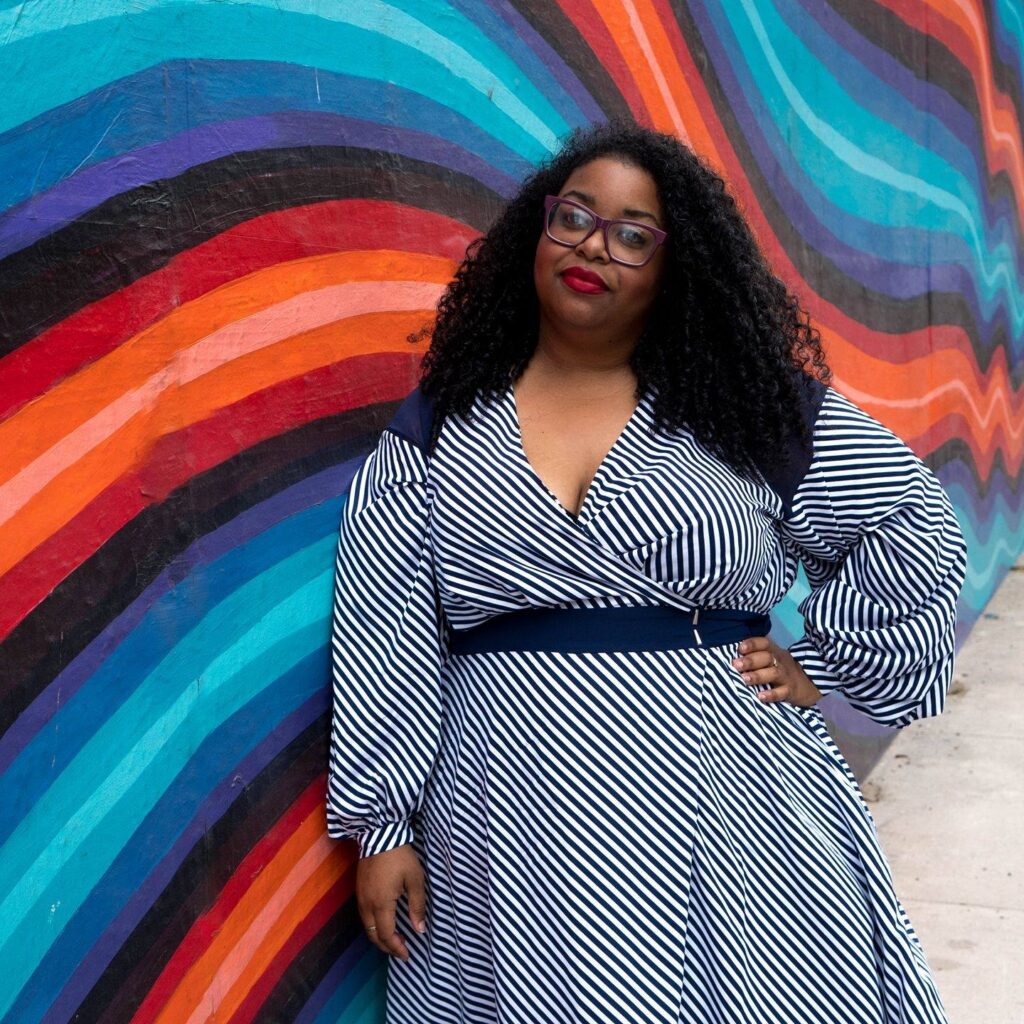
PIP: To wrap up, how do you deal with the emotional toll and labor of this work? How do you take care of yourself?
JM: I think because I positioned what I do in such a way that is not exhausting to me, but comes from my strength. Empathy is my No. 1 strength, but I also know that you can’t save everybody.
My focus was on progressive business owners and business leaders. Mainly because they’re the ones who will have a sphere of influence with other people who I probably don’t want to deal with, to be quite honest. I know I also have the emotional bandwidth to be a little more generous with people, what I call #wellmeaningwhitepeople, who don’t know the thing they’re about to say could be traumatizing or the thing they’re trying to impact may be traumatizing. I know I have the emotional bandwidth to deal with it more than some other people.
So if I can position myself in such a way where I can do that but I’m saving other people from not having to, I’ll be OK. I think coming from a place of strength, structuring what I do offer in terms of anti-racism and inclusion education, to where it’s small one-on-one groups. And I’m not giving stuff away for free; that’s always a big component. If I’m going to do this work, it won’t be free. I’ll also be very specific about who I’m talking to.
But most importantly, giving myself a lot of restorative care both before and after. That’s rest, that’s walks, by myself and with my dog. That’s making sure I’m eating food that’s helpful to my body and not harmful to my body. Journaling, going to the botanical garden and just chilling, taking a bubble bath. My restorative care could look basic, but I identify the ways that I can get restoration. I don’t even call it self-care, it’s restoration, and I try and give back to myself.
Every day is hard for me to maintain, because some days I’m busy, but I try to have touchpoints throughout the week where I’m like, hey, are we OK? Do I need a break? Do I need to take off social media? I’ve been better about scheduling it with app timers on my phone so I’m on it less.
Making sure I not just close my computer but actually shut it down at the end of the day so I’m less likely to reopen it.
Just creating those touchpoints of restoration so that you can get through it. Because it can be very exhausting if you try to push through it and pretend that like, oh that comment didn’t hurt. Or damn, they had to unpack that? That shouldn’t be a thing you need to unpack. But it allows me to come from a place of grace and empathy.
I think it was Brene Brown on her podcast who said that it comes to movements, there are people who provide light and there are people who provide heat. The people who provide heat will hold your feet to the freaking fire, and the people who provide light will provide optimism and awareness.
I know I provide light. Because if I’m providing heat, if I’m in anger or in fury, I’m burning myself up too. And I don’t want that. I’m not willing to offer myself on the sacrificial pyre. In order to come from a place of grace and empathy, and compassion, I know I have to give myself a lot of restoration, and I’m working on not beating myself up because of that. Because sometimes I’m like, Why are you sleeping so much? You need to hurry up and work! So you have reframe a lot of things.
I know I’m annoyingly diplomatic. I put people at ease even sometimes when I don’t want to. I don’t know if it’s anxiety or what, but that’s just something I do well. I know I can present things in a way that makes people slow down and think about it. Again, when you hear people say, “It’s not my job to educate you as a black person or queer person or woman or whatever identity,”I get that and I believe that. It’s not everybody’s job of a specific community to be an educator.
But if I can sit or stand in this space, because of things that I do well, and if I’m able to articulate things in a way that penetrate, then I’m gonna do that. Because I know that I can.
If you’re a progressive business owner, make sure to sign up for Jordan Maney’s Ally to Advocate Summit now!

